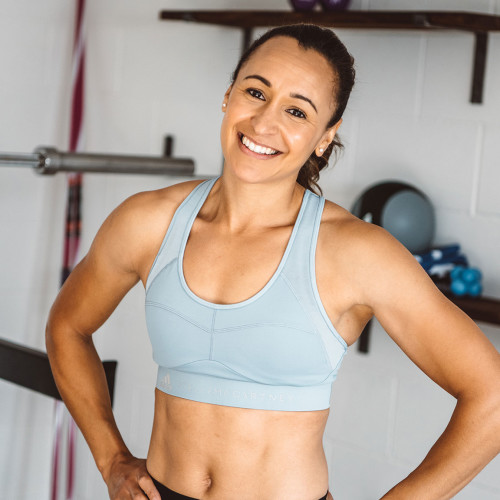How many calories can you burn doing one of Jessica Ennis-Hill's home HIIT circuits?
3 years ago
Training3 years ago
Training
Health journalist Carole Beck explains the high-intensity home circuits on Jessica Ennis-Hill's exercise programmes can impact your metabolism
Some of you have been asking about the calorie burn of the HIIT circuits in Jessica Ennis-Hill's Jennis programmes, so we’ve done a bit of investigating. Before we go too deep, it’s difficult to say 'exactly' how many calories you'll burn because it depends on certain factors , including:
• Your gender – men burn more calories than women
• Weight – if you weigh more, you’ll burn more calories
• Age – younger people burn more calories than older people
• Body composition – if you have more muscle, you’ll burn more calories
• How hard you work out – you’ll burn more if you’re someone who pushes yourself harder
• Your fitness level – super-fit people are more efficient at producing energy, so burn fewer calories when not exercising
But, what we do know is that HIIT and pyramid principles may help you burn up to 25-30% more calories than if you jog or cycle at one pace, known as ‘steady-state’ exercise.
According to a 2015 study in the Journal of Strength and Conditioning Research , which investigated calorie spend for nine healthy men, HIIT-based workouts came out on top for per minute calorie burn:
• HIIT workout – burned 12.50 calories per minute
• running – 9.48 calories per minute
• cycling – 9.23 calories per minute
You’ll burn 25-30% more calories doing a Jennis Fitness interval training workout than if you jog or cycle at one pace
It’s all about your oxygen intake . When we exercise, our bodies convert oxygen into energy – so high-intensity exercise will use more oxygen than steady state activities, so lead to a greater calorie burn.
It turns out that it’s not just the exercise that matters – you’ll burn extra calories after you’ve hung up your trainers, too. This is because of a phenomenon called ‘ excess post-exercise oxygen consumption ’ (EPOC), also known as ‘afterburn’.
This is the amount of oxygen it takes to restore your body to its normal resting state after an intense workout. Remember, your body needs to perform important tasks after exercise, like repairing muscles and filling energy stores – and because all these jobs require oxygen, they also burn calories.
High-intensity exercise – like the Jennis workouts, which you can do at home, or the HIIT-inspired Outdoor Body Blasts – produce a longer EPOC period than a jog or cycle ride performed at one speed, according to a 2017 study in International Journal of Exercise Science .
Metabolic rate was still raised 22 hours after a high-intensity interval resistance training workout when compared to a traditional resistance training workout
HIIT workouts, such as Jessica Ennis-Hill's fitness coaching circuits, are effective at reducing body fat – and not just stomach fat, but also the internal fat that can accumulate inside your body and surrounds your organs.
A 2018 US study found that 12 weeks of HIIT workouts led to a decrease in total body fat and an increase in lean body mass for women. One theory is that this type of fat burn is a result of a raised metabolic rate after an intense workout.
So, if you’re looking to lose weight, get fit and do it efficiently, the home circuits featured in the Jennis programmes could well be the answer!
 Cycle syncing
Cycle syncing Perimenopause
Perimenopause Perimenopause
Perimenopause Perimenopause
PerimenopauseSign up to learn everything you need to know about CycleMapping, plus how you can live better and feel better through optimising your fitness to you.
This website uses cookies to ensure you get the best experience on our website. Learn more

Sign up for the very latest news on women's fitness, health and hormones, plus be the first to receive exclusive offers and extras